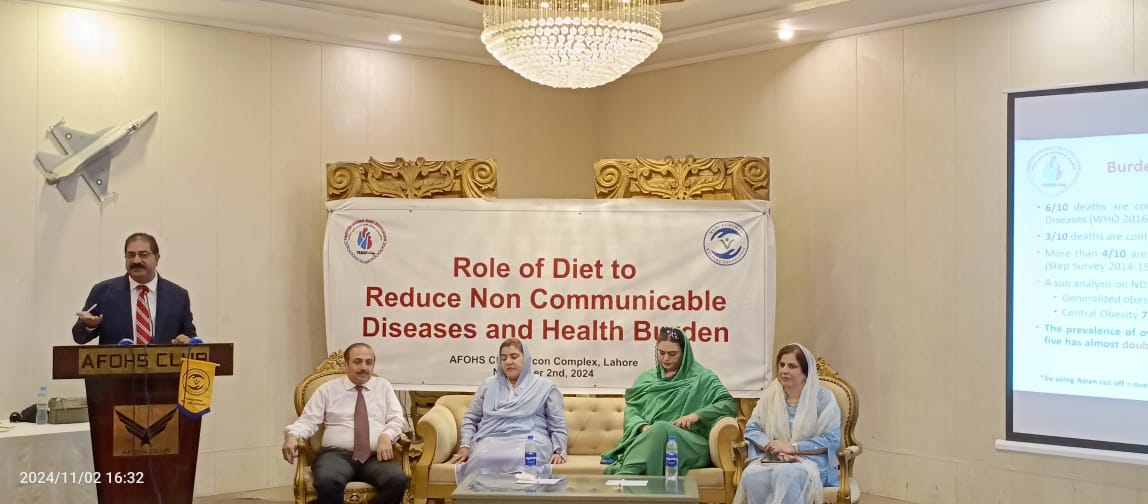 LAHORE – The surge in non-communicable diseases (NCDs) in Pakistan and worldwide poses a dire threat to public health and economic stability. Accounting for nearly 60% of deaths in Pakistan, NCDs take a heavy toll on lives, disrupting the economy and burdening the healthcare system. The rising consumption of unhealthy foods—particularly ultra-processed foods high in sugar, salt, and trans fats—fuels this health crisis, contributing to conditions such as heart disease, diabetes, and kidney issues.
LAHORE – The surge in non-communicable diseases (NCDs) in Pakistan and worldwide poses a dire threat to public health and economic stability. Accounting for nearly 60% of deaths in Pakistan, NCDs take a heavy toll on lives, disrupting the economy and burdening the healthcare system. The rising consumption of unhealthy foods—particularly ultra-processed foods high in sugar, salt, and trans fats—fuels this health crisis, contributing to conditions such as heart disease, diabetes, and kidney issues.
To combat this trend, numerous countries have implemented effective policy measures, including taxing unhealthy foods, banning their advertising, restricting sales in schools, and adding front-of-pack warning labels. These strategies have proven successful, reducing the consumption of unhealthy foods and encouraging healthier dietary choices. Pakistan, too, must take similar measures to alleviate its disease burden and economic strain.
These insights were shared during a program organized by the civil society organization Meri Pechan and the Pakistan National Heart Association (PANAH). Attendees included former Punjab Director General of Health Dr. Fayyaz Ahmed Ranjha, Kidney Transplant Surgeon and Head of Department at Jinnah Hospital Lahore Dr. Naveed Iqbal, Meri Pechan President Ms. Shahida Naveed, PANAH Secretary General Mr. Sanaullah Ghumman, and other representatives from health, civil society, and media.
Dr. Fayyaz Ranjha highlighted the escalating healthcare burden, noting that NCDs are not only increasing suffering and mortality but are also severely straining the economy. He emphasized that the cost of diabetes alone in Pakistan is estimated at $2.7 billion annually, double the latest installment Pakistan received from the International Monetary Fund. He urged the government to act swiftly, implementing policies that limit the availability of ultra-processed foods and enable healthier choices.
Dr. Naveed Iqbal underscored the alarming rise in kidney disease, noting that even young children are increasingly affected. He linked these diseases to ultra-processed foods, which are laden with sugars, salts, and trans fats, leading to conditions like diabetes and hypertension that exacerbate kidney problems. He called for immediate legislative action to curb the consumption of these harmful products.
Mr. Sanaullah Ghumman presented detailed data on the health risks associated with ultra-processed foods and their undeniable connection to rising NCD rates. He shared that other nations’ policies, such as increased taxes, marketing restrictions, school bans, and warning labels, have effectively reduced the consumption of unhealthy foods, resulting in a noticeable decline in NCDs. PANAH is working tirelessly to promote similar regulations in Pakistan to safeguard public health and ensure a healthier future for generations to come.
Ms. Shahida Naveed welcomed participants and emphasized the joint commitment of Meri Biraj and PANAH to protect the health of Pakistanis. She expressed dedication to furthering public education and awareness on healthy dietary choices.
Speakers at the event collectively urged the government to implement critical policies that limit unhealthy food consumption and promote better health outcomes for all Pakistanis.
Sub Editor: Ghufran